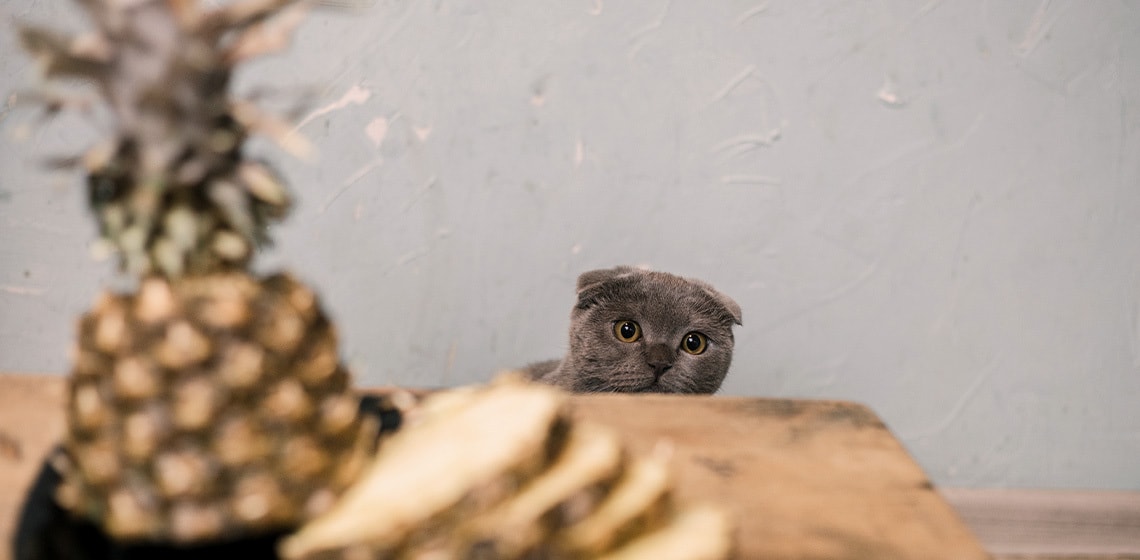Table of Contents
Are pineapples safe for cats?
The good news is that pineapple is safe for cats, so if you want to share some of this exotic fruit with your cat, then you can. The ASPCA has pineapple in its list of safe food that you can share with your four-legged friends. However as with any fruit or vegetable, moderation is key, so stick to small amounts.
Are pineapples good for cats?
For people, we know that pineapples are an excellent source of vitamin C, which helps keep immune systems healthy as well as skin and connective tissue. Pineapples are also high in fiber which can help aid digestion.
This tropical fruit also provides the following essential vitamins and minerals –
- Vitamins A, B6, E, and K
- Calcium
- Folate
- Iron
- Magnesium
- Phosphorus
- Potassium
- Zinc
While our cats may benefit from a little nutritional boost now and again, it’s worth bearing in mind that they don’t actually require an external source of Vitamin C. Humans, guinea pigs, and fruit bats are the only animals that need fruit and vegetables to provide this nutrient, all other animals (including cats) manufacture their own source.
As for the other nutrients, if your cat is on a good quality complete diet then he should already be receiving the correct balance of nutrition. Most cat vets would advise sticking to your cat’s normal diet as much as possible, but the occasional small pineapple treat is unlikely to cause any harm.
While our cats may benefit from a little nutritional boost now and again, it’s worth bearing in mind that they don’t actually require an external source of Vitamin C.
When is pineapple bad for cats?
Feeding raw, unsweetened pineapple flesh is relatively safe for cats if given as an occasional treat. If offered in large amounts this could cause problems and be bad for your pet’s digestion. Vomiting and diarrhea could occur if any fruit or vegetable is fed excessively to your cat.
Don’t feed your cat pineapple skin or leaves as these are very tough and hard to digest. There is a risk they could cause a blockage in your pet’s digestive tract, making them very unwell. Some cats enjoy chewing on these parts of the fruit, due to their tough, rubbery texture but it’s safest to redirect them to a cat-safe toy instead.
You should also avoid feeding them pineapple in sugary syrups or as part of a rich treat like pineapple upside-down cake. These will add unwanted calories to his diet leading to weight gain and the high sugar content could contribute to stomach upsets. Equally pineapple yogurts or yogurt-coated dried pineapple are not recommended as some cats are unable to process lactose that easily (a sugar found in milk).
If pineapple is offered in large amounts this could cause problems and be bad for your pet’s digestion.
Do cats actually like pineapple?
Some cats like pineapple, but equally some cats don’t! Cats don’t taste sweet foods in the same way that we do because of the difference in their taste receptors. However, what they may enjoy is the meaty, flesh-like texture of the fruit. They might also find it refreshing and thirst-quenching due to the high moisture content of the fruit.
Some cats may eat pineapple out of curiosity. Cats are usually a bit more particular about what they eat than dogs are, but this isn’t always the case! Just make sure your cat explores safely and only eats pineapple flesh rather than the tough leaves or skin.
Cats don’t taste sweet foods in the same way that we do because of the difference in their taste receptors.
So… Can I give my cat pineapple?
Yes, you can, but moderation is key. Even safe fruit like pineapple can cause tummy upset if given in large amounts. It’s best to offer pineapple as an occasional treat rather than feeding in bulk. Your cat should be getting all the nutrients that they need from a good quality commercial diet, so there shouldn’t be a need to supplement them with other food items. It’s also worth remembering that cats don’t require many of the nutrients that we need from fruit, like vitamin C (they manufacture their own source).
Remember, never force your cat to eat pineapple, some like it and some don’t. But next time you tuck into some juicy pineapple yourself, feel free to offer your cat a little taste!
FAQ
No, pineapple is not toxic to cats and appears on the ASPCA’s list of foods you can safely share with your pet. As with any fruit or vegetable you should only ever feed it in moderation to your cat in case you cause unwanted tummy troubles. In case such troubles persist, you should contact your veterinarian.
Any fruit or vegetable that you offer your cat should not make up more than 10% of their daily diet. It’s probably best to stick to one or two small pineapple chunks at a time to avoid digestive upset.
Although they can’t taste sweet things in the same way that we can, some cats enjoy the texture of pineapple. It is quite fibrous and meaty in texture, as well as moist and thirst-quenching. Not all cats will want to eat pineapple though so never force your pet to try it if he doesn’t want to.
Many fruits are safe for cats to eat in moderation, including strawberries, melon, bananas, pears, blueberries, and nectarines. However, as cats are strict meat-eaters you should stick to their normal diet where possible as too many fruits or vegetables could cause vomiting and diarrhea.

Rebecca is a companion animal vet who has always had a passion for writing and client communication. Since her graduation from the Royal Veterinary college in 2009, she has gained a wealth of experience in first opinion small animal practice, in both clinical and managerial roles. She currently works in the South West and deals with a variety of routine and emergency appointments, but particularly enjoys medicine cases. Outside of work and writing, she enjoys spending time with her family, including her bouncy flat-coated retriever George!








